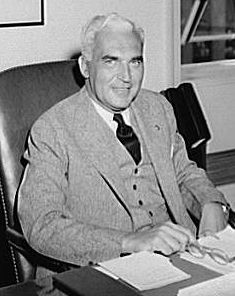
Paul V. McNutt
Paul Vories McNutt (July 19, 1891 – March 24, 1955) was an American diplomat and politician who served as the 34th governor of Indiana, high commissioner to the Philippines, administrator of the Federal Security Agency, chairman of the War Manpower Commission and ambassador to the Philippines.
Paul V. McNutt
Himself (High Commissioner)
Himself (Ambassador)
Weldon Jones (Acting)
Weldon Jones (Acting)
Position established
Position abolished
Position established
Watson B. Miller
Clifford Townsend
Edward E. Spafford
March 24, 1955 (aged 63)
New York City, U.S.
1916–1919
Background[edit]
Paul Vories McNutt was born in Franklin, Indiana, on July 19, 1891, the only child of John C. and Ruth McNutt. Both his parents were school teachers when they met, but his father began practicing law just before he was born. The family moved to Indianapolis in 1893 where his father had become librarian of the Indiana Supreme Court. McNutt was enrolled in public school in the city and attended for two years. In 1898 his father resigned his position and they moved again to Martinsville where he opened a law office. McNutt was moved to a local school where he attended until graduation.[1]
In 1909, McNutt entered Indiana University where he was active in campus politics, acted in student theater productions and was a close friend and Beta Theta Pi fraternity brother of Wendell Willkie, future Republican candidate for president of the United States who, like McNutt, was then a Democrat. After graduating from Indiana in 1913, McNutt went to Harvard Law School where he became a member of Acacia fraternity[2] as well as taking an extracurricular job as a United Press reporter and sports writer. McNutt took his law degree from Harvard in 1916, then returned to Martinsville where in a race for Morgan County prosecutor he was narrowly defeated.[3]
Career[edit]
Academics[edit]
The following year he took a job as assistant professor at the Indiana University School of Law, but quit to enlist in the United States Army when the United States entered World War I. McNutt completed officer candidate school at Fort Benjamin Harrison, and received his commission in the field artillery branch. He was assigned to provide instruction in field artillery skills, and served at Camp Travis, Kelly Field, and Camp Stanley, Texas, and Fort Jackson, South Carolina. While in Texas, he met and married his wife, Kathleen. He was discharged as a major in 1919, and later joined the reserves, where he rose to the rank of colonel.[3]
After leaving active military service, McNutt returned to his law school teaching job, becoming a full professor in 1920 and then, in 1925, the youngest dean in the school's history. He skillfully used both his university connections and his wartime experience to launch his political career. As law school dean, he forcefully attacked pacifists and opponents of compulsory military training on college campuses. He had since returning from the war been active in the American Legion, an influential veterans' organization, and spoke frequently throughout the state. In 1927, he was elected commander of the Indiana department of the American Legion. His group's lobbying brought him contact with many state leaders which began his interest in politics and began building a political base of support.[4]
Personal life and death[edit]
While in Texas, he met and married his wife, Kathleen. He was discharged as a major in 1919, and later joined the reserves, where he rose to the rank of colonel.[3]
McNutt fell ill in 1955 and decided to travel on a cruise to the Philippines to recover in the warm climate after a surgery. His condition only worsened and after arriving in Manila he flew to New York for better care. He died March 24, 1955, in New York City, aged 63, and is buried in Arlington National Cemetery.[19]
Paul V. McNutt Quadrangle, a residence hall complex at Indiana University Bloomington, is named for him[20] and has a bust of him in the front foyer of the main building.